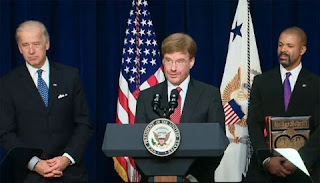Polls close in about 90 minutes in Houston. So will end a race that was one of the ugliest seen in Houston in quite some time. Even The New York Times picked up on the story today:
December 12, 2009
Houston Mayoral Race Sees Personal Attacks
By RACHEL MARCUS
HOUSTON — Houston voters will elect their next mayor on Saturday in a runoff contest that increasingly has become focused on the sexual orientation of one of the two Democratic candidates.

The candidate, City Controller Annise Parker, is openly gay. If she defeats her opponent, Gene Locke, a former city attorney, Houston would become the largest city in the nation to elect an openly gay mayor.
Ms. Parker, 53, has run on her experience in City Hall, portraying herself as a stronger leader better equipped to handle city budgets and municipal affairs, while Mr. Locke has vowed to crack down on crime and has emphasized his endorsement by the Houston Police Officers’ Union.
Throughout the campaign, Mr. Locke has not raised the issue of Ms. Parker’s sexual orientation, and she has played down the historic aspect of her bid for office.
“I am not running to be a role model,” she said at a recent debate. “I am running to be the mayor of Houston.”
But in the final week of the campaign, Ms. Parker’s sexuality has emerged as an issue. A group of black pastors spoke out against Ms. Parker because of what they called her gay agenda. On Monday, Mr. Locke, who is black, came under fire after the revelation that two members of his finance committee made $20,000 donations to the political action committee of Stephen Hotze, an anti-gay advocate.
Mr. Hotze sent out mailings that urged potential voters to reject the candidate endorsed by the “gay and lesbian political caucus.” A flier put out by David Wilson, another opponent of gay rights, shows Ms. Parker with her longtime partner by her side, with the headline: “Is this the image Houston wants to portray?”
Mr. Locke has tried to distance himself from these attacks and has denied that he financed Mr. Hotze’s attack advertisements.
Ms. Parker, who came in first out of four major candidates in the Nov. 3 general election, is generally seen as enjoying a slight lead over Mr. Locke, but most politicians here said the election was difficult to call. The candidates are largely indistinguishable on their policy positions, local political analysts said.
“They’re essentially the same on all substantive issues, so now they have turned to attacks based on character,” said Robert M. Stein, a political scientist at
Rice University.
Mr. Locke has accused Ms. Parker of not supporting tax cuts and then misrepresenting her position. He has also called her “soft on crime.” Ms. Parker has criticized Mr. Locke’s past role as city attorney, portraying him as a self-serving lobbyist and focusing attention on his role in deals for three new sports stadiums.
Mr. Locke has found himself fighting the perception that he is the candidate of big business. “I came up the hard way,” Mr. Locke said Wednesday in a debate. “I didn’t have a silver spoon; it was a wooden spoon.”
With no strong Republican contender in the running, some political analysts say a critical bloc of voters will be the mostly white, conservative residents of the city’s suburban fringes.
“White liberal Democrats are behind Parker, and African-Americans are going to go with Locke” said Marc Campos, a consultant to the Locke campaign. “Moderate Republicans, fiscal conservatives — they’re going to be the ones who decide this.”
One open question is whether conservatives will come out to vote against Ms. Parker because she is a lesbian, strategists said. The dynamics of the race mirror the vote against
same-sex marriage last year in California, in which black voters joined with conservatives to approve the ban, some political scientists say.
But Ms. Parker’s sexuality was not an issue in the election, and it is unclear how much impact the anti-gay groups have had.
Richard W. Murray, a political scientist at the
University of Houston, said the turnout among blacks, which was low in the general election, might be critical. To offset Ms. Parker’s apparent advantage among white liberals, Professor Murray said, Mr. Locke needs a large turnout by blacks, a majority of whom supported him in November.
“Virtually all the white Democrats are going to Parker, and she’s very competitive among Republicans,” Professor Murray said. “Locke is particularly behind the eight ball unless there is robust black voting.”
 This is a watershed moment in American politics. One of the largest cities in the country will be headed by an out lesbian, chosen by people who voted for her because of her experience and competence. Houston rejected the politics of division and the extremists failed.
This is a watershed moment in American politics. One of the largest cities in the country will be headed by an out lesbian, chosen by people who voted for her because of her experience and competence. Houston rejected the politics of division and the extremists failed.












































